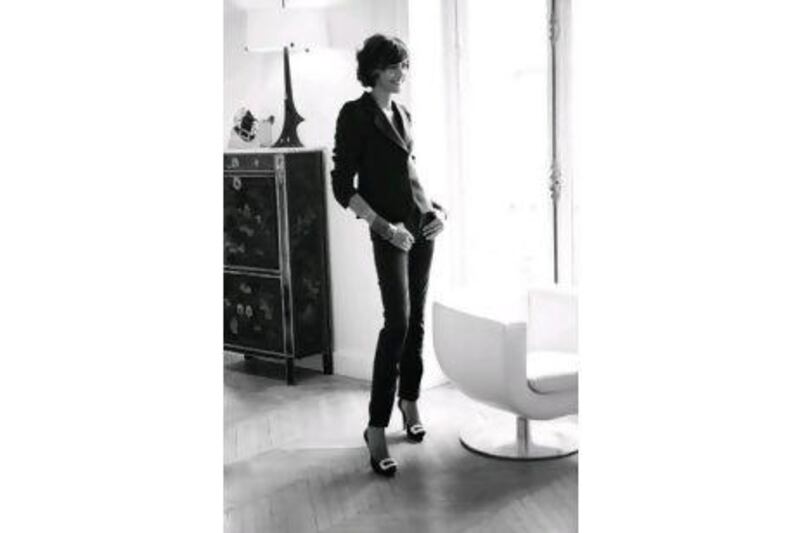Inès de la Fressange was the original French supermodel. Born in the Var region of France in 1957, Inès Marie Lætitia Églantine Isabelle de Seignard de la Fressange, or La Belle Inès as she is known in France, is the daughter of a French marquis, André de Seignard de La Fressange, and an Argentinean model, Cecilia Sanchez Cirez. Her grandmother was the heiress to the Lazard banking fortune. Her book, Parisian Chic: A Style Guide, is out now. In the 1980s she was known as the face of Chanel and became Karl Lagerfeld's muse for several years. In 1989, she followed in the footsteps of the French actress Catherine Deneuve to become one of the models on whom the French national symbol Marianne is modelled. In June this year she was awarded France's most prestigious award, the Légion d'Honneur. She runs the exclusive designer shoe label Roger Vivier in Paris. She shared her desert island book choices with Helena Frith Powell.
ROBINSON CRUSOE by Daniel Defoe
Mainly because it is one of those books, rather like The Three Musketeers and Don Quixote, that is hugely famous and I am embarrassed to say that I haven't read. But I also want to take it along to find out how to meet Friday. My second choice would be the Bible; there are lots of good stories in it and also it will be useful for me to swat up on who's who, as I can never remember. In addition, on a desert island there's plenty of time to deal with God.
THE ILIAD AND THE ODYSSEY by Homer
You'll notice I am only taking extremely thick books. I seem to spend my life saying I have never found the time to read this or that. The Iliad and The Odyssey are books I decided I should have read years ago and haven't; so now I will finally have the time. Also, there will be a distinct lack of culture on the island so I will bring my own. I suppose I could also use them as a table should I need one, or maybe I will ask Friday to make me a table, or bring a practical manual out with me and learn how to make essential items.
ANTHOLOGY OF FRENCH POETRY
I would find the biggest and most comprehensive anthology I can and spend the long afternoons learning Villon, Du Bellay, Éluard, Hugo, Baudelaire, Verlaine and all the others. I think that, with age, you become sensitive to poetry. A few weeks ago I read some Baudelaire and was astonished by how beautiful it is. I won't always be rushing about so I will have time to appreciate poetry. Also I will need beauty, and poetry will give me that. Finally, when I come home, I will impress my daughters who will have been struggling with poetry at school and I will just know it all.
MÉMOIRS D'OUTRE-TOMBE by François-René de Chateaubriand
Julien Gracq called them a "sublime romantic sunset". There are 42 volumes. I read some of them when I was young but rather under duress, like I read Proust. When I started re-reading them I really appreciated them. I want to dedicate myself full time to completing all the volumes and not just dip in and out while reading other things at the same time. If you focus on something that is well-written, the language enters you and you assimilate it.
THE ART OF HAPPINESS by the Dalai Lama
I will need to create my own happiness on the desert island and so I would take along the Dalai Lama's book along with all the books written by a friend of mine, Sophie Fontanel, who makes me laugh more than anyone else I know. She is the funniest girl of her generation; her choice of words is extraordinary and utterly original. I would bring Sophie with me so I can laugh alone. There is too much violence in the world, and the Dalai Lama's book is like a medicine, a magical potion which helps me to imagine life without violence. It is better than an aspirin.
LE MUSEE IMAGINAIRE by André Malraux
Finally. I want to use the time to become more cultured and intelligent so I would take this book. I have lots of literature but I am missing art and my culture. I will be somewhere where there is no past, which is terrifying. It will feel as if it is the end of the world. None of my usual cultural references are there, no old stones, no museums. When you have that all the time you don't notice it but when it's missing something doesn't feel right
L'HOMME QUI PLANTAIT DES ARBES by Jean Giono
Is it a novel? An essay? A fairy tale? Actually, it is a short story National Geographic asked Giono to write. He was supposed to describe someone he had met. The story was a huge success, but when the magazine understood it was fiction they were very angry; Giono was surprised one could reproach a writer like that. However, the idea is that a man alone can transform a region - ideal for a desert island book!






